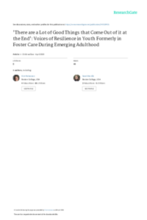Displaying 581 - 590 of 2176
The aim of the study was to document mental health service use (counseling and medication) among youth in foster care, examine how prepared they feel to manage their mental health, and investigate predictors of service use and preparedness.
This article interrogates formal public evaluations of extended care programmes with a particular focus on their eligibility criteria that have determined which groups of care leavers are included or alternatively excluded and the identified strengths and limitations of the programmes.
This quantitative study investigated how selected attributes of children (e.g., gender) and their microsystems (e.g., caregiving settings) related to the receipt of special education among a sample of 1855 child welfare-involved youth from the U.S. National Survey of Child and Adolescent Well-Being II.
"Twenty-seven migrant children in government custody had tested positive for coronavirus as of Monday, according to the latest update from the Office of Refugee Resettlement, the federal agency charged with their care," says this article from CNN.
Using a scoping review framework, the authors of this study sought to take stock of the state of the science of the programs and interventions (PIs) currently available for young people who age out of foster care.
This study examined the impact of homelessness, foster care, and adverse childhood experiences (ACEs) prior to 12th grade on the development of three common Substance Use Disorders (SUDs) during young adulthood
In this article for Truthout, Michelle Chan describes her own experience of having her son removed from her care and placed in foster care and the impacts of the COVID-19 pandemic on families like hers.
The study documents the impact of the need-service gap (client did not receive the service they need) on family reunification status among substance-involved parents in the child welfare system.
This study reports the perspectives of college students with foster care histories and self-identified mental health concerns about how these factors relate to their post-secondary academic experiences.
This study uses interviews with 20 youth formerly in foster care who exhibit better-than-average outcomes to explore contextual aspects of resilience during emerging adulthood, elucidating how both relational and organizational support contribute to their resiliency.

